Project News
February 28, 2017
Project News in February 2017
1. Short-term expert training "Climate Change and Agricultural Production"
JICA TCP short-term expert training "Climate Change and Agricultural Production" provided by Dr. ANDO Ho (Professor Emeritus, Yamagata University) was continued from the last month until 12th February.
The wide varieties of topics and exercise were given, including;
- Current conditions of global warming,
- Skepticism of global warming and its counterarguments,
- Causes of global warming,
- Effects of greenhouse gas emissions and agricultural production to global warming,
- Effects of global warming to societies,
- Countermeasures for reducing greenhouse gas emissions,
- Countermeasures in agricultural sectors for reducing greenhouse gas emissions,
- Effects of global warming on agricultural production, and others.
The lectures were delivered while confirming the participants' understanding through active Q&A sessions. In addition, three experiments (two pot-trials and one field-trial) were organized to investigate the effects of global warming on agricultural production using wet rice and leaf vegetables as materials, through which the importance of experiment design and data collection was also emphasized so that the participants could obtain practical knowledge for conducting research. The participants were divided into three groups and each one carried out the following experiments. They were designed to provide the participants with the opportunities of learning how to set the high-temperature (air/soil/water) condition and how to appropriately cope with unexpected problems or happenings that may take place in the course of the implementation. The experiments were designed with the objectives of making the participants understand the following topics:
- Effects of high temperature on tillering of wet rice,
- Effects of high-temperature of soil on T/R ratio of leaf vegetables, and
- Effects of high-temperature on the growth of wet rice in the mid-term growing stage (including trials of how to create high-temperature conditions in paddy fields with simple and easy method).
Using the data obtained, each group made presentation and Q&A was exchanged actively among participants and expert. Although the duration was limited, the training program must have been a significant and valuable occasion for each and every participant to reconsider the importance of conducting research and experiment as an independent researcher.
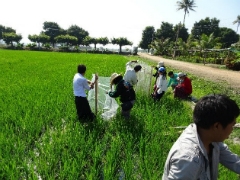 Setting of high-temperature condition (9 February 2017)
Setting of high-temperature condition (9 February 2017)
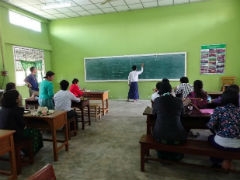 Presentation and discussion (10 February 2017)
Presentation and discussion (10 February 2017)
2. Short-term expert training "Integrated Pest Management (IPM)"
JICA TCP short-term expert training "Integrated Pest Management (IPM)" by Dr. NAKAMURA Satoshi (Chief Researcher, JIRCAS) also continued from the last month to 7th February, including field trip to Aungban and Pindaya, Shan State on 3rd to 5th February. Total 17 out of 22 participants joined field trip to collect and observe pest insects and useful natural enemies at various farms.
In the class, Dr. Nakamura introduced his case studies on IPM conducted in SE Asia and Africa. Also, he provided practical training for raising parasite insects which would have potentials to become natural enemies. The teaching styles of Dr. Nakamura involving frequent interactions with the participants gave fresh impression to YAU teachers. The program, then, seems to have been welcome as a good opportunity for learning not only IPM but also teaching methods.
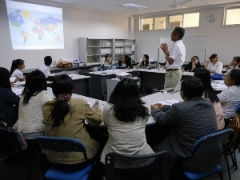 Lecture by Dr. Nakamura (TCP Office, Jan. 30, 2017)
Lecture by Dr. Nakamura (TCP Office, Jan. 30, 2017)
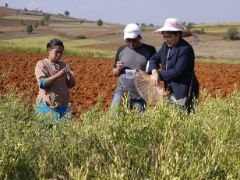 Insect collection (Pindaya, Feb. 3, 2017)
Insect collection (Pindaya, Feb. 3, 2017)
3. JICA TCP and SEARC jointly organized General Education Training Workshop
JICA-TCP supported the short-term training program on "General Education Program in Addressing Food Security", which was collaboratively organized by YAU and SEAMEO/SEARCA from 20th to 24th February.
SEAMEO/SEARCA dispatched Dr. Daylinda Cabanill and Dr. Maria Cristeta as lecturer and facilitator for the program, respectively. They provided lectures with workshop to help the participants learn actively about 1) theory of general education and pedagogy, 2) class-room study and experienced learning, 3) development of teaching materials, 4) course design, and others.
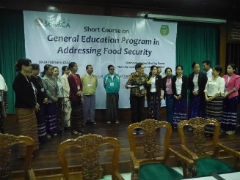 Dr. Daylinda Cabanilla and Participants (Feb. 20)
Dr. Daylinda Cabanilla and Participants (Feb. 20)
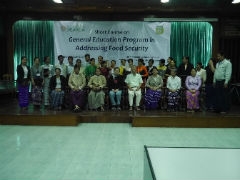 Closing Ceremony (Feb. 24)
Closing Ceremony (Feb. 24)
As Permanent Secretary of MOALI, Dr. Tin Htut attended both Opening and Closing Ceremony of this seminar, YAU and MOALI have a great concern for the development of general education in YAU. In this sense, the program has been instructive and significant to the development of future curriculum of YAU, for instance, how to introduce class subjects of liberal arts and sciences to current curriculum of YAU. In YAU, education of languages (Myanmar and English) and basic sciences such as mathematics, chemistry, physics and biology has ever been recognized as basic education, but the concept of general education has never been well acknowledged. Reflecting such circumstances, many challenging discussions, such as the introduction of humanities and social sciences in curriculum, availability of human resources, necessary budget, and harmonization with current specialization subjects, were exchanged.
4.Implementation of Pilot Research
1) Each research group in the Pilot Research Program conducted fieldworks as follows.
- 4th, 12th, 19th and 25th February
RB-03 group collected insects and re-located and re-installed insect traps for next seasons in 7 Townships in Nay Pyi Taw. - 15th-17th February:
RB01-1 group conducted surveys on leguminous crops at Phyinmana TS in Nay Pyi Taw. - 18th-20th and 25th-27th February:
RB01-1 group conducted surveys on horticultural crops at Thonegawa TS in Yangon. - 21st-23rd February and 28th February to 2nd March:
RB01-1 group conducted surveys on leguminous crops at Thonegawa TS in Yangon. - RA01-1 (Plant Breeding Group)
About 100 cultivars transplanted last month, which consists of local varieties collected by the team, those provided by Seed Bank and breeding lines (F6) screened by the Dept. of Plant Breeding, were grown at the experimental farm of YAU. A team in the group completed the trials for measuring growth habits and yielding abilities of the varieties having deep-water tolerance which were collected at Thanatpin Township, Bago, and their growth and yield data are analyzed. 15 varieties including those from Thantpin are tested to determine the tolerant abilities for submergence. - RA-02-1 (Plant Pathology group)
Pathogens of rice blast and leaf blight collected in Zaya Thiri and Phyinmana were continuously cultured, and bacterial specimens from these samples were preserved. - RB-02-1(Plant Pathology group)
Identification of nematode was conducted using soil samples collected in sesame-growing areas in Magwe. - RB-03-1(Entomology and Zoology group)
The data related to chronological and seasonal changes of harmful insects, such as the kind of insects and population, has been accumulated to establish insect alert model. - RC-01-1(Agronomy group)
The change and transformation of oil contents of sesame seeds collected at farms and in supply chains have been measured. - RC-01-2:
Data analysis for those collected in the fields started.
2) Laboratory and in-farm experiments were also conducted using the samples collected through previous surveys.
5.Voluntary Seminar was launched
Prof. Yamamoto, JICA long-term expert of TCP, began to periodically hold voluntary seminar with young academic staff (Assistant Lecturers and Demonstrators) of YAU every Saturday in January for the purpose of improving reading comprehension and presentation skill through mutual reading of and discussion on published academic reports and papers concerned. It also aims to support YAU staff to sustainably keep their research concerns activated by respective short-term expert trainings. Four young staff attended the seminar in February.
- About JICA
- News & Features
- Countries & Regions
- Our Work
- Thematic Issues
- Types of Assistance
- Partnerships with Other Development Partners
- Climate Change / Environmental and Social Considerations
- Evaluations
- Compliance and Anti-corruption
- Science and Technology Cooperation on Global Issues
- Research
- JICA Development Studies Program / JICA Chair
- Support for the Acceptance of Foreign HRs / Multicultural and Inclusive Community
- Publications
- Investor Relations
